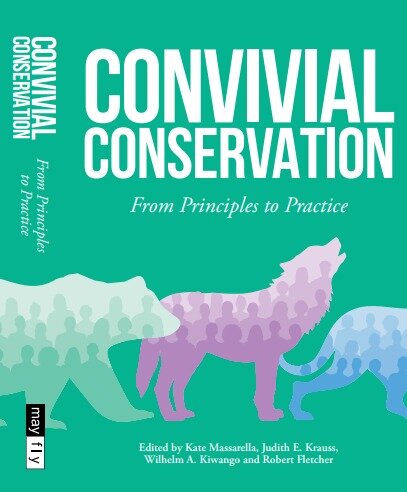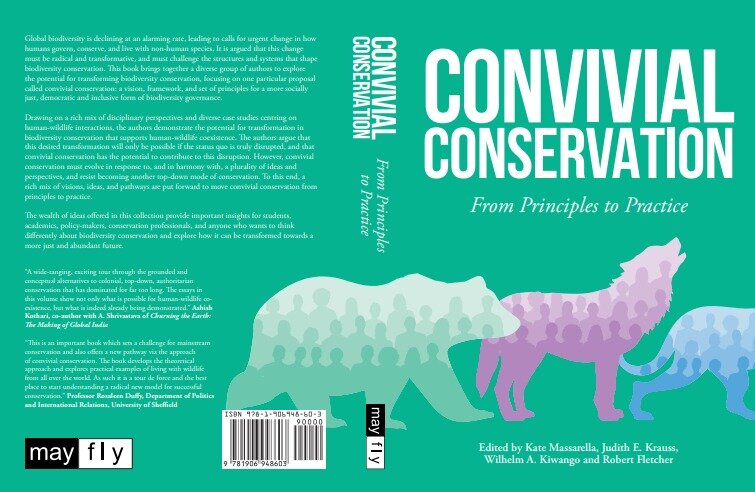By , , &
What should the future of biodiversity conservation look like? Against a backdrop of rapid biodiversity loss, alternative visions offer conflicting visions on how to preserve the diversity of life on which human survival depends. One vision, , emphasises the need for 30% of land to be reserved for nature by 2030, proposing to significantly expand existing land areas under protection. that protected areas in the past and present in some regions have entailed injustice and physical or economic displacement. Some highlight colonial and racist roots in dominant ideas of conservation, calling instead for decolonising conservation.
In response to the critiques of protected area expansion, and in the face of economic, social, and environmental polycrisis, an alternative approach to conservation has been proposed: convivial conservation. Convivial conservation proposes a vision, a politics and a set of governance principles for the future of conservation that responds to manifold pressures of our time. It proposes a post-capitalist approach which promotes radical equity, structural transformation and environmental justice in order to create a more equal and more sustainable world.

contributes new insights into the potential of the convivial conservation proposal to transform biodiversity conservation. Co-edited by CONVIVA team members Kate Massarella, Judith Krauss, Wilhelm Kiwango and Rob Fletcher, the book has just been published by the Open Access publisher MayFly Books. It features 15 chapters by authors from diverse disciplines, backgrounds and research foci, who critically engage with the convivial conservation proposal and offer crucial reflections on its strengths and possibilities. It both outlines the principles of convivial conservation and highlights how they land in the practice of different species and contexts, aiming towards a transformative vision for the future of conservation.
Three key themes recur throughout the authors’ contributions. The first is justice, exploring how justice – understood as epistemic, participatory/multi-species justice, and distributive justice, building on Schlosberg’s (2004) three pillars of environmental justice, namely recognition, participation and distribution – can be better conceptualised in convivial conservation in order to be transformative. A second focus is unpacking the concept and implementation of human-wildlife coexistence. The third theme is identifying and developing methodologies for investigating and facilitating transformative change in conservation research and practice, drawing on diverse ontologies and more-than-human thinking and approaches. Fundamentally, the book argues that convivial conservation has the potential to offer an alternative vision for the future of conservation in the Anthropocene, but only if it continues to evolve through critical engagement with these different themes and a plurality of diverse perspectives.
The first part consists of an introduction by the co-editors, which unpacks these three key themes, along with ‘Towards convivial conservation’ by Bram Büscher and Rob Fletcher, which outlines the principles of the convivial conservation vision. The second part focuses on pluralising and decolonising conservation and its first contribution by Mathew Bukhi Mabele, Judith Krauss, and Wilhelm Kiwango explores the potential for ‘going back to the roots’ through Ubuntu and just conservation in Southern Africa. Christine Ampumuza then explores the lessons for convivial conservation offered by Batwa-gorilla relations in Bwindi Forest in Uganda. Judith Krauss then analyses Ivan Illich’s conviviality and convivial conservation through a decolonising lens, before Paolo Bocci completes the section by highlighting the roles of both culture and agriculture in convivial conservation by analysing how ‘resilience’ is understood in the Galapagos Islands.
The third part turns to the issue of rethinking human-wildlife interactions. Kate Massarella and Valentina Fiasco first analyse ‘coexistence’, asking whether this increasingly popular buzzword presents an opportunity for transformative change or business as usual conservation. Hanna Pettersson, Claire Quinn, George Holmes and Steven Sait then explore how to better understand conducive conditions for human-wolf coexistence in north-western Spain. Svetoslava Toncheva, Rob Fletcher, and Esther Turnhout continue the theme by unpacking human-bear cohabitation in Bulgaria’s Rodopi Mountains. The section is completed by Séverine van Bommel and Susan Boonman-Berson’s call for transforming convivial conservation through more-than-human participation in research.
Part four then focuses on alternative governance and financing mechanisms for the future of conservation, starting with Fletcher and Büscher’s proposal for conservation basic income as a non-market alternative to market-based mechanisms common in mainstream conservation. Elaine (Lan Yin) Hsiao then explores how conviviality can flourish in disrupted socionatural landscapes through ‘ecological peacebuilding’, using a case study of Akagera National Park in Rwanda. Revati Pandya then unpacks how micro-politics influence prospects for convivial conservation around the Corbett Tiger Reserve in India, and George Iordăchescu explores the potential for convivial conservation in Europe through the possibility of reclaiming the commons. The collection is then rounded off by Wilhelm Kiwango and Mathew Bukhi Mabele making a case for why convivial conservation needs complementing to be a viable alternative for conservation in the Global South, emphasising that different political-economic structures require acknowledgement in applying convivial conservation to contexts such as Tanzania.
The full book is available (can also be ordered in print).
Two podcasts detail the special section on which this edited collection is based: firstly with the guest editorial team and Wilhelm Kiwango, and secondly with Revati Pandya, Hanna Pettersson, Valentina Fiasco and Kate Massarella (video versions with auto-generated captions can ). We have also highlighted all chapters in this , with more details on individual chapter contents in the original special section.
